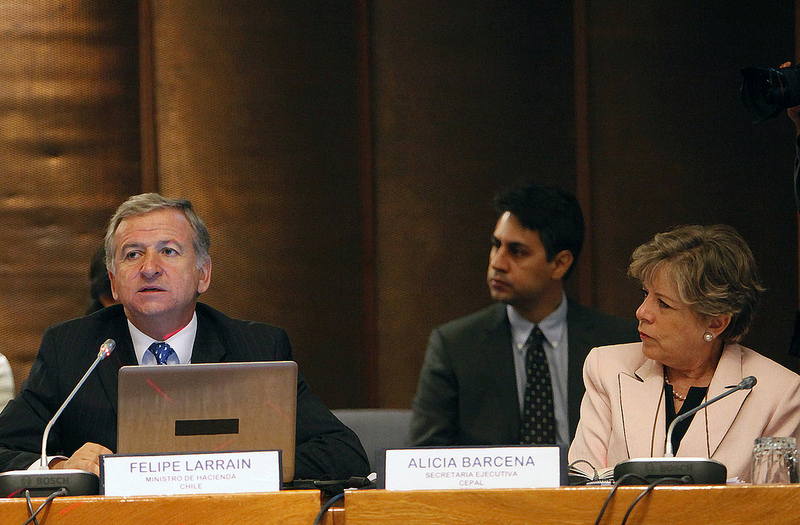Authorities and Experts Reaffirm Importance of Fiscal Covenant and Economic Growth for Increasing Tax Income and Improving Equality
Topic(s)
25th Regional seminar on fiscal policy is attended by Ministers of Finance of Chile, El Salvador and Uruguay.

(5 March 2013) Constructing fiscal covenants and the importance of maintaining stable economic growth are two key factors in increasing tax income and improving equality, according to experts meeting today at the ECLAC headquarters in Santiago, Chile, at the 25th Regional seminar on fiscal policy.
The meeting, organized by the Economic Commission for Latin America and the Caribbean (ECLAC) with the support of the International Monetary Fund (IMF), the World Bank, the Inter-American Development Bank (IDB) and the Organisation for Economic Co-operation and Development (OECD), is being attended by the Ministers of Finance of Chile, El Salvador and Uruguay, as well as by renowned international experts.
The meeting was opened by Alicia Bárcena, Executive Secretary of ECLAC, who emphasized the importance of the seminar, which after 25 years has become an essential reference point in discussions of the region's economic and fiscal situation.
According to Ms. Bárcena "In order to achieve equality - which is an ethical guideline and a strategic vision for our region's present and future development - we need a new relationship between the State, market and society including fiscal and social covenants".
The Executive Secretary of this United Nations Commission added "In this sphere, fiscal policy plays a crucial role and the clear aims of fiscal covenants must be to: increase tax revenues by making them progressive, reduce evasion and increase the capture of income from natural resources".
The Finance Minister of Chile, Felipe Larraín, gave a presentation at the opening ceremony that stressed the relevance of economic growth as the main source of collecting fiscal revenues.
He stated "tax reform helps collection, but it is not the only factor. The State can collect much more if it has sustained and powerful growth".
Finance Minister of Salvador, Carlos Cáceres, explained the various tax reforms implemented in his country in recent years. While he agreed that growth was important for achieving good levels of collection, he also highlighted the need for other instruments such as monetary policy and support from multilateral institutions to achieve social targets.
According to Minister Cáceres "Our aim is to increase fiscal revenues to 17% of GDP (from 12.9% currently), so as to address social disadvantages. This forces us to seek a fiscal agreement that involves society as a whole".
At the first day of the seminar, the ECLAC Executive Secretary presented the Commission's new publication: Fiscal panorama of Latin America and the Caribbean: tax reform and renewal of the fiscal covenant, which provides an up-to-date overview of the tax situation in Latin America and the Caribbean, and suggests a policy framework based on reciprocity to focus the issue of tax policy.
In her presentation, Alicia Bárcena pointed out that reciprocity between the State and citizens, particularly as reflected in the willingness to pay taxes, is the fundamental basis for a fiscal covenant.
She went on to say "An integrated view of development that coordinates the economic, social and environmental dimensions calls for stakeholders who get involved, commit and coordinate. In this sense, the role of the State and a policy revival are key for structural change with equality and environmental sustainability. Equality is the aim, structural change the path and policy the instrument".
The 25th Regional seminar on fiscal policy will end tomorrow Wednesday 6 March with presentations from renowned experts and authorities, including the Minister of Economy and Finance of Uruguay, Fernando Lorenzo.
The meeting is sponsored by the Spanish Agency for International Development Cooperation (AECID), the German Federal Ministry for Economic Cooperation and Development (BMZ) through the German Academy for International Cooperation (GIZ), and the International Tax Compact (ITC).
The seminar will be accompanied by a Workshop on Public Finances, which will also be held at the ECLAC headquarters on Thursday 7 March, to examine recent reform in terms of decentralized public revenues and spending - which is a vital component of sustainable fiscal covenants.
Any queries should be sent to the ECLAC Public Information and Web Services Section.
E-mail: prensa@cepal.org; Telephone: (56 2) 2210 2040.
Follow us on: Twitter, Facebook, Flickr and YouTube.
Related content
Authorities and Experts Will Assess Tax Reform Aimed at Increasing Fiscal Revenues and Improving Equality
Meeting will be attended by the Ministers of Finance of Chile, El Salvador and Uruguay.
Country(ies)
- Latin America and the Caribbean
Related project(s)
Contact
Public Information Unit
- prensa@cepal.org
- (56 2) 2210 2040

